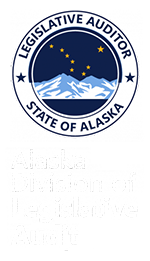| SUMMARY OF: | A Sunset Review and a Special Review of the Department of Commerce, Community, and Economic Development, Alcoholic Beverage Control Board |
Why DLA Performed This Audit
The purpose of the audit was to determine if there is a need for the board’s continued existence and whether its termination date should be extended. In addition, the audit examined the board’s license process and identified the cause of delays. The board is scheduled to sunset June 30, 2022, and will have one year from that date to conclude its administrative operations.
Report Conclusions
Overall, the audit found that board meetings were conducted effectively, regulations were adopted to implement statutory changes, and investigations were conducted in a timely manner. The audit also concluded that the Alcohol and Marijuana Control Office’s (AMCO) operations were impeded by the lack of an automated application process and significant vacancies. Further, deficiencies in controls over processing licensee fee refunds were identified.
A review of the board’s license process identified that 76 percent of new license applications and 85 percent of transfer applications received during FY 19 and FY 20 were issued within six months. A backlog of renewal applications caused by unfilled vacancies led AMCO staff to issue approximately 300 temporary licenses in February 2021, which allowed licensees to continue operating pending application review. The audit identified the following opportunities for gaining licensing efficiencies:
1. Improving the completeness and accuracy of initial applications.
2. Reducing delays associated with waiting for compliance information.
3. Issuing licenses timely once all information has been received.
Automating the application process and filling vacancies in a timely manner are key to improving efficiency.
In accordance with AS 44.66.010(a)(1), the board is scheduled to terminate on June 30, 2022. We recommend the legislature extend the board’s termination date to June 30, 2026, which is four years less than the maximum allowed in statute. The reduced extension reflects the need for more timely oversight to evaluate the board’s progress in addressing licensing inefficiencies and filling vacancies.
Findings and Recommendations
- The DCCED commissioner should ensure AMCO staff vacancies are filled in a timely manner and the AMCO director should implement written licensing procedures.
- The board should significantly enhance or replace its licensing database and automate the application process where possible.
- The board and AMCO director should strengthen procedures for entering restricted purchasers in the statewide database of written orders.
- The board and AMCO director should implement procedures to ensure municipalities receiving funds of biennial license fees are actively enforcing alcoholic beverage laws.
- The AMCO director should improve procedures and fill vacancies in a timely manner to ensure refunds to municipalities are appropriately reviewed.

